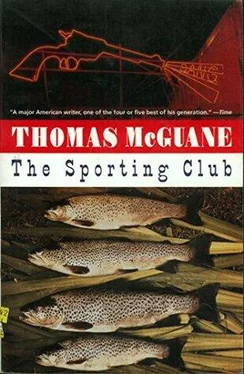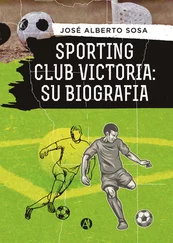Quinn helped her with her coat. It was a dressy, tailored coat with a velvet collar and looked good with the old cotton slacks she wore. Quinn could see that she was feeling what had settled over the club; the apprehension widened her eyes and emphasized the almost foxlike shape of her face. Then his mind wandered from Janey in dejection and replaced her with Mary Beth complete with bagpipes. Doggedly, Quinn watched himself unwind her kilt; but instead of the herring-white Scots flesh he has resigned himself to, he discovers a set of prickly duck-hunters’ underwear. What’s the meaning of this?
“The meaning of what?”
“Talking to myself.”
* * *
What a smell! Anyone would think that people who had as many pretenses as these club members had would have the decency to go a little way from the tent. And the body odor, especially the women, was not the reassuring funk of laborers; this was the smell of people who had been deep in deodorants until a couple of days ago; it was something smarmy, acidic and sour. Quinn made his way along the tent. He recoiled from one odor to another until, in resignation, he accepted and his nose pumped steadily at the single generalized odor that was a meld of everything from axilla to organic debris and smelled like clam soil.
People went to and fro as though in a blackout, with a rather useless air of carrying on. A portable generator ran somewhere and lightbulbs hung in the trees, swung and heaved in the breeze and threw monstrous shadows everywhere. The children were playing in the black rectangle of shadow at the end of the tent and their fierce voices came brokenly. “… no, you can’t!.. Eat it raw!” Then the piping voice of a little girl, “Okay for you, Billy! Now I have to kick you in the noogies!” Quinn was shoved rudely from behind. It was Fortescue carrying the front end of a small platform. “If you can’t help, get out of the way.” Stanton came past carrying the other end. They placed it opposite the center of the collapsed tent, that is, between the tent and the Bug House. Quinn glared after Fortescue. When Fortescue had put his end down he looked back and caught Quinn’s eye. “Go home, Quinn! Please go!”
“Let’s hurry it up,” Stanton said to him. “I’ve got stuff to do.”
“Is this speech going to be long?” Fortescue asked.
“Brief, very brief, very brief.”
“What about a little fireworks first?”
“Okay, give ’em fireworks.”
“The singing though.”
“Give ’em the fucking singing.”
“What about a couple of rockets, see, and then you have the singing coming right in there afterward.”
“Get this: I don’t care. But whatever it is, make it snappy.”
“Sure, okay. We have all the time in the world. Spengler burned his chronicle, you know. So, we’ll have more time for you.”
Quinn approached. “What’d he burn his chronicle for?”
“Come on,” Fortescue said, “get a move on.”
“Said we don’t deserve it,” Stanton said impatiently.
“Everybody together for the fireworks and singing,” Fortescue called. “Charles,” he shouted past Quinn, “Reveille!” Charles Murray materialized looking a little worn but well preserved. He put the bugle to his mouth and took it down again.
“This won’t be terribly good,” he said.
“Blow,” said Fortescue, and Murray raised the bugle to his smiling lips. What came out was nothing like Reveille at all. It was a forlorn sound and reminded Quinn of the noise that must have been made by those animals that were the transitional phase between birds and reptiles. But everyone gathered around and sat crosslegged in front of the platform, behind which Murray now knelt on one knee striking matches. Soon a little string of sparks hung in the air before him and he whirled, ran, then bit the dust as the first rocket, then the second and third shot aloft and burst flowers of color on the sky. Murray sang:
“O-oh, say can you see,
By the dawn’s early light,
What so proudly we hail,” etc.
People took the song up, standing at attention under trees, canvas and the influence of intoxicants. Children ceased their industrious grubbing to salute our flag. When the singing stopped, more rockets went aloft. One fell over as it was lit and hit Mrs. Scott in the belly without damage. The projectile was covered with a blanket before it went off and when it did, it did so with a cough and writhed like an animal underneath, finally burning its way through in a thousand places. Mrs. Scott, meanwhile, ran through the camp howling. Quinn remarked the quality of her voice which was like the singing tops of his youth: a fluty, metallic sound, cyclical and, for a human voice, quite unacceptable. Stanton cried, “Shut the twat up before she wrecks the party!” This swung unfriendly attention upon himself that was only dissipated by the spectacle of a fiery wheel racing on a guy wire, back and forth between two trees. Then Quinn watched Scott confront Stanton and tell him he didn’t have to put up with this kind of behavior. “Do you realize what could have happened to her?” exclaimed the irate academician. “That could have blown her insides out!”
“No harm there.”
“What—?”
Stanton walked away. The attention of the crowd now flickered between him and the fireworks and their eyes seethed like frogs’ eggs about to hatch. Stanton prowled. When there was a pause in the fireworks, he cried, “ON WITH THE GIZMOS!” Stars and stripes appeared, pinwheels and carnations popped on the sky like drops of paint on glass. One rocket went up and exploded with a terrific crack, and since there was no visible display the darkness seemed a picture. Murray ran around with a lighted punk setting things off, rockets that shot from troughs or off sticks, some that whistled and screamed like V-2s and buzz bombs. What was needed was the sound of hordes, real Dino di Laurentiis hordes, Kirk Douglas directing Vandals, Saxons, Celts, Wogs, their women in tailored skins showing a bit of tit. Murray did his best. He raced around setting fire, but it was so incomplete without the sound of hordes, though the steady upward stream of fiery trails, the streaking back and forth of the burning wheel, the whistles, explosions and chemical colors aloft were enough. “ON WITH THE GIZMOS!” At the far end of the tent, the children were lofting firecrackers into the group, and when they’d blow and the bits of fiery cardboard flew around, the women screamed and struck at their clothes as though there were spiders on them.
“How about lending a hand for a change,” Fortescue said to Quinn, indicating the antic Murray.
“Right you are,” Quinn said, not moving but winking most agreeably. Quinn went into the tent to get away from the fun. The first thing he noticed were the shapes that the lights threw on the tent from outside, distorted human shapes that moved at unnatural speed, appeared as recognizable silhouettes, then burst out of their forms to blacken the whole end of the improvised tent. Under the canvas ledge, reading a magazine, was the handsome little mother who had caused Quinn to fall down so foolishly at the beach. He wandered toward her as though on a retracting tether, as though he needn’t even move his feet. She put the magazine down and smiled first on one side and then on the other. When he spoke, his voice came from the past. “Nice to see you,” he said, after Scott. She wouldn’t pretend to speak. She smiled now and then arbitrarily and had very white teeth, very white. “I’ve been thinking about you ever since,” Quinn said. He sat down and began to poke and fuss around experimentally. Half an hour later, giddy with foreplay, he thinks, Oh, my god, my god, oh, my god. Can they see me? Quinn looked around to the entire open front of the tent. Oh, my god, I know they could if they wanted to and I don’t care I’m going at it anyway and isn’t she nice. He could see the line of the bathing suit that had confined his view at the beach while her child beat the sand with its little shovel. My god, I am going to score right out of the blue, I am I tell you. Spengler, someone, keep them distracted, tell them this proves it, the West is not declining, or does this prove it is; but give them absolutely any theory that will distract them and I will score if you do; keep them mindful of our country’s origins. The rockets’ red glare. Let them have it. Quinn worked toward the last buttons one-handed; the other did its rooting with an especially scurvy lewdness; she rested on her elbows and the breasts slipped to the sides, then she let down on her back. In a minute I’ll be at it like some hyperthyroid mongoose. She hooked a forefinger in the corner of her pretty mouth, her face rosy with the strange light, the monster show still sweeping over the canvas from outside. Isn’t she lovely. Like some precocious baby, my valentine goo goo. He began to thrash and struggle violently with his own clothes like a pickerel in a bucket. Get these god damned duds off without losing the old momentum. Keep it up someone out there but I don’t care if you don’t. Nothing is to come between me and my febrile plans. Now shall I introduce myself? She doesn’t smell as bad as some of these birds. The bombs bursting in air gave proof through the night that our flag was still there. There: look at me, naked and glorious, God is a good god in his fashion. That’s it, take the little devil, he’s yours. The forefinger still in the mouth. Then she puts the thumb in the other corner and neatly collapses her face by removing a surprising set of dentures. Ohmygod! Her chin is under that nose. That face is trying to smile. That face thinks this is funny. I don’t care I don’t care. Put a bag and remember the flesh of this flesh. Presently she accommodates him, as a wild Cucaracha howls outside on the loudspeaker. She stares listlessly at a small spot on the canvas. Quinn lost no time. As he did so, he heard a cry, “ON WITH THE GIZMOS!” then perceived waggish Stanton, winking, taking a chorus of La Cucaracha and doing an expert Samba in the entranceway. Quinn, expended, could hardly go on. He was now irritable and — he faced up to it — doing little more than lurching. “Keep it upp,” she gummed impassively. Quinn knew that people had been watching by now and he was upset. “They’ve seen my ass!” he whispered harshly.
Читать дальше












